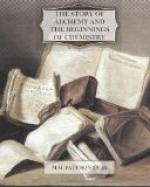Magic is an attempt, by thinking and speculating about what we consider must be the order of nature, to discover some means of penetrating into the secret life of natural things, of realising the hidden powers and virtues of things, grasping the concealed thread of unity which is supposed to run through all phenomena however seemingly diverse, entering into sympathy with the supposed inner oneness of life, death, the present, past, and future. Magic grows, and gathers strength, when men are sure their theory of the universe must be the one true theory, and they see only through the glasses which their theory supplies. “He who knows himself thoroughly knows God and all the mysteries of His nature,” says a modern writer on magic. That saying expresses the fundamental hypothesis, and the method, of all systems of magic and mysticism. Of such systems, alchemy was one.
CHAPTER II.
A sketch of alchemical theory.
The system which began to be called alchemy in the 6th and 7th centuries of our era had no special name before that time, but was known as the sacred art, the divine science, the occult science, the art of Hermes.
A commentator on Aristotle, writing in the 4th century A.D., calls certain instruments used for fusion and calcination “chuika organa,” that is, instruments for melting and pouring. Hence, probably, came the adjective chyic or chymic, and, at a somewhat later time, the word chemia as the name of that art which deals with calcinations, fusions, meltings, and the like. The writer of a treatise on astrology, in the 5th century, speaking of the influences of the stars on the dispositions of man, says: “If a man is born under Mercury he will give himself to astronomy; if Mars, he will follow the profession of arms; if Saturn, he will devote himself to the science of alchemy (Scientia alchemiae).” The word alchemia which appears in this treatise, was formed by prefixing the Arabic al (meaning the) to chemia, a word, as we have seen, of Greek origin.
It is the growth, development, and transformation into chemistry, of this alchemia which we have to consider.
Alchemy, that is, the art of melting, pouring, and transforming, must necessarily pay much attention to working with crucibles, furnaces, alembics, and other vessels wherein things are fused, distilled, calcined, and dissolved. The old drawings of alchemical operations show us men busy calcining, cohobating, distilling, dissolving, digesting, and performing other processes of like character to these.




